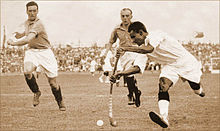Bharat Ratna
Instituted on 2 January 1954, the award is conferred in recognition of "exceptional service/performance of the highest order", without distinction of race, occupation, position or gender.
The award was originally limited to achievements in the arts, literature, science, and public services, but the Government of India expanded the criteria to include "any field of human endeavor" in December 2011.
The Bharat Ratna, along with other personal civil honours, was briefly suspended from July 1977 to January 1980, during the change in the national government; and for a second time from August 1992 to December 1995, when several public-interest litigations challenged the constitutional validity of the awards.
In 1992, the government's decision to confer the award posthumously on Subhas Chandra Bose was opposed by those who had refused to accept the fact of his death, including some members of his extended family.
[5] The first suspension occurred when Morarji Desai, who was sworn in as the fourth Prime Minister in 1977, withdrew all personal civil honours on 13 July 1977.
It has been awarded to a naturalised Indian citizen, Mother Teresa in 1980, and to two non-Indians, Abdul Ghaffar Khan of Pakistan in 1987 and the former South African president Nelson Mandela in 1990.
[15] The Bharat Ratna is conferred "in recognition of exceptional service/performance of the highest order", without distinction of race, occupation, position, or gender.
Usage of the title 'Bharat Ratna' as a prefix by the awardee is exempt from Article 18 (1) of the Constitution,[b] as per the Supreme Court's precedent in Balaji Raghavan/S.P.
[2][4] The original 1954 specifications of the award was a circle made of gold 1+3⁄8 inches (35 mm) in diameter with a centered image of the sun on the obverse side.
A platinum State Emblem of India was placed in the center of the reverse side with the national motto, "Satyameva Jayate" in Devanagari Script (Sanskrit: सत्यमेव जयते; lit.
[7][28][29][30][31] On 23 January 1992, a press release was published by the President's secretariat to confer the award posthumously on Subhas Chandra Bose.
[28] The petitioner requested the whereabouts of Bose from 18 August 1945 to date, based on the information collected by the 1956 Shah Nawaz Committee and the 1970 Khosla Commission.
[34][41] The decision was also criticized for awarding Ramachandran before prominent independence activists B. R. Ambedkar and Vallabhbhai Patel, who were bestowed the honor later in 1990 and 1991 respectively.
[50] In 1991, then prime minister P. V. Narasimha Rao was criticized for bestowing the award upon Sardar Patel in 1991, 41 years after his death in 1950; and upon Subhas Chandra Bose in 1992, who purportedly died in 1945.
[50][51] In 2015, the prime minister Narendra Modi's decision to award Madan Mohan Malaviya, who died in 1946, close to the local body elections in Uttar Pradesh was also met with criticism.
[54] In 1999, Amartya Sen was awarded the Bharat Ratna, a year after his 1998 Nobel Memorial Prize in Economic Sciences.
Editorials of Indian newspapers have observed that the BJP strategically uses the Bharat Ratna to integrate figures like L K Advani, balancing narratives around mandir (temple) and Mandal (social justice).
Though, as per the statutes for the Bharat Ratna, the recommendations for the award can only be made by the Prime Minister to the President, there have been several demands from various political parties publicly to honor their leaders.
[62] In September 2015, regional political party Shiv Sena demanded the award for the independence activist Vinayak Damodar Savarkar stating that he had been "deliberately neglected by previous governments" but his family clarified that they are not making such demand and that the freedom fighter is known for his contribution towards independence movement and did not need an award for recognition.
[17] Subsequently, several sports-persons' names were discussed; amongst them were field-hockey player Dhyan Chand and former world chess champion Viswanathan Anand.


